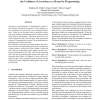Free Online Productivity Tools
i2Speak
i2Symbol
i2OCR
iTex2Img
iWeb2Print
iWeb2Shot
i2Type
iPdf2Split
iPdf2Merge
i2Bopomofo
i2Arabic
i2Style
i2Image
i2PDF
iLatex2Rtf
Sci2ools
ICSM
2002
IEEE
2002
IEEE
Two Controlled Experiments Concerning the Usefulness of Assertions as a Means for Programming
Assertions, or more generally “Programming by contract”, have gained widespread acceptance in the computer science community as a means for correct program development. However, the literature lacks an empirical evaluation of the benefits a programmer gains by using assertions in his software development. This paper reports two controlled experiments that close this gap. Both experiments compare “Programming by contract” to the traditional programming style without assertions. The evaluation of the first experiment suggests that assertions decrease the programming effort for the extension of existing software, measured as time needed to finish the task, while the programming effort slightly increases during the development of new code. The second experiment shows that the programming effort tended to be larger with assertions than without. In addition, it shows that the reliability of the written programs slightly increases with the usage of assertions compared to the progr...
Correct Program Development | ICSM 2002 | Programming Effort | Software Engineering | Traditional Programming Style |
Related Content
| Added | 15 Jul 2010 |
| Updated | 15 Jul 2010 |
| Type | Conference |
| Year | 2002 |
| Where | ICSM |
| Authors | Matthias M. Müller, Rainer Typke, Oliver Hagner |
Comments (0)

